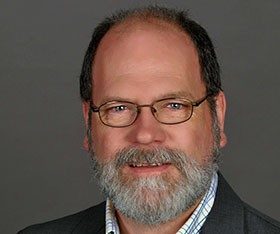Matthew Russell

Matthew Russell
Senior R&D Technologist
Corteva Agriscience
Rose-Hulman Institute of Technology
United States Air Force
In 1985, Matthew Russell was a National Merit Scholar on his way to earning a bachelor’s degree in mechanical engineering and mathematics from Rose-Hulman Institute of Technology in Indiana. But with finances tight and a family to support, Russell left college to enlist in the United States Air Force. While stationed at the US Air Force’s Technical Applications Center in Sacramento, California, now located at the Patrick Air Force Base in Florida, Matthew discovered a new passion: analytical chemistry.
Today, Matthew is a senior R&D technologist at Corteva Agriscience in Indianapolis. As an expert in solids analysis, Matthew tests how powders and granules will behave in manufacturing, while formulating a product, or in use by a farmer.
His many accomplishments—achieved over a career spanning military and industry roles—were recently recognized with the 2022 ACS National Chemical Technician Award. One key to Matthew’s success is his hyper attention to detail and planning. It may sound simple, he says, but take the time to learn everything you can about a new analytical instrument before firing it up.
Curiosity is one of the most important traits in research and development. You can teach and train somebody for a lot of things, but you can’t teach curiosity.
How did you choose your career in chemistry?
In one way, it actually chose me after I completed four intense months of training at the USAF training center in Denver. I was interested in physics, so I asked to join the physics department at the lab I was assigned to in California. But what they really needed was someone in that group to prep radioactive environmental samples for further analysis, which was a lot of chemistry. So, chemistry wasn’t exactly what I chose in the beginning, but that experience got me started in a career that I’ve enjoyed for almost 40 years now.
After your service in the Air Force, you joined Eli Lilly and Co. in Clinton, Indiana, as an analytical laboratory technician working in quality control of antibiotics. How did this new industry role differ from your military experience?
I loved what I did in the Air Force. But it was a very unique situation where only a few people worked on each project. Everything was classified, so you couldn't talk to anyone else about what you were doing. Moving to Eli Lilly was a real learning experience for me because suddenly I could communicate with a lot of different people and get their help if I needed to figure out how to do an analysis or repair an instrument.
What do you do now as a senior R&D technologist at Corteva Agriscience?
My primary responsibility now is working in a solids handling lab. We look at the physical properties of powders used to produce pesticides and the final products, and ask questions like: How does it flow? How does it behave? How does it interact with moisture? Understanding these properties allows you to engineer equipment in a way that keeps the powder moving through the process properly.
What do you like most about your current job?
I enjoy the challenge of always having something new and different to test. When I arrive at work each morning, I don’t know what I might be working on that day. I could have 15 different requests from all different stages of R&D—from products early in development through well-tested products that have been on the market for years.
Is there a particular product that you helped develop that you are especially proud of?
We make a bait station to control termites called Sentricon that earned a green chemistry award from the EPA. I spent 20 years, on and off, working on this product from the early stages of its development through supporting its manufacturing and use in the field. It’s been one of those products that you can hold up and say, this was an innovative, environmentally friendly, awesome idea, that then became a product that is helping many people.
What advice do you have for students who want to pursue chemical technical work?
Go as far in your education as you can. But make sure you complete whatever degree you are working on. My path worked for me, but I don’t think anybody could do it starting today because the field has become more competitive.
To be successful as a chemical technical professional, you also need to cultivate your drive to figure out how things work. Curiosity is one of the most important traits in research and development. You can teach and train somebody for a lot of things, but you can’t teach curiosity. You need to have that inside of you and develop that yourself.

